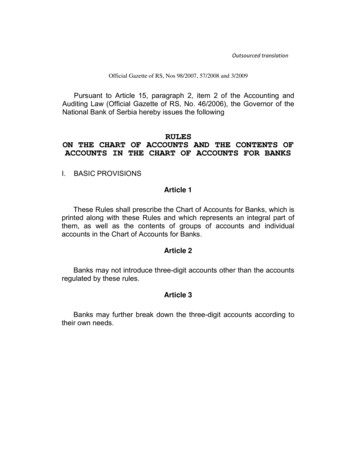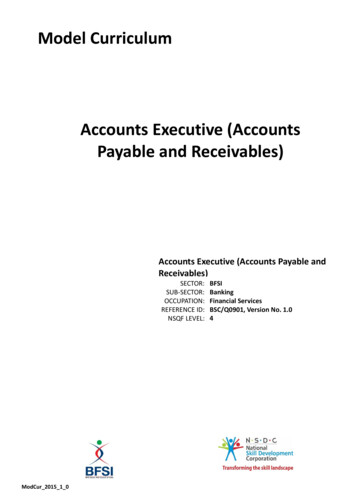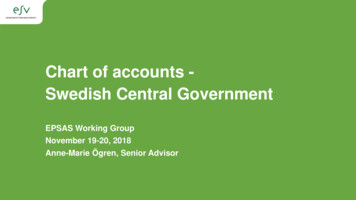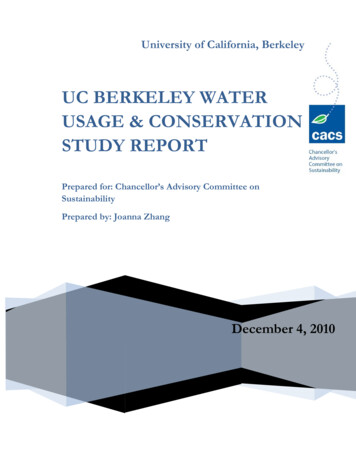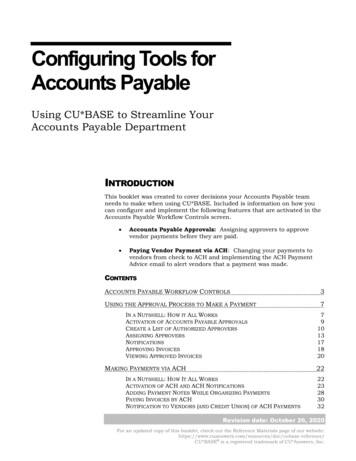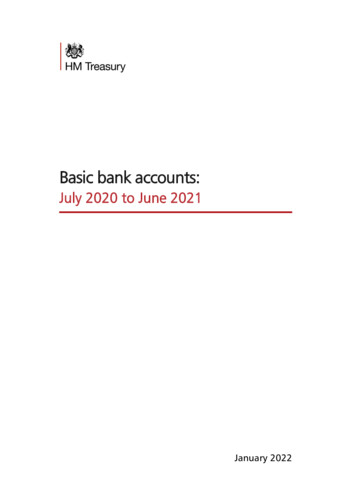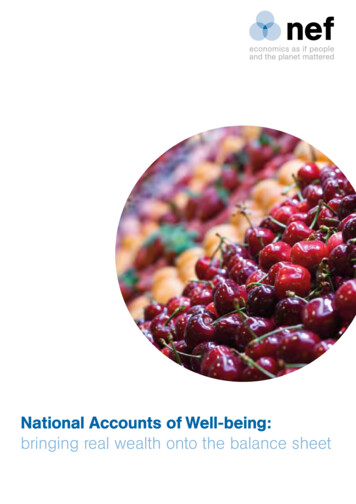
Transcription
National Accounts of Well-being:bringing real wealth onto the balance sheet
nef is an independent think-and-dotank that inspires and demonstratesreal economic well-being.We aim to improve quality of life bypromoting innovative solutions thatchallenge mainstream thinking oneconomic, environmental and socialissues. We work in partnership andput people and the planet first.www.nationalaccountsofwellbeing.orgnef was awarded the International Society for Quality-of-Life Studies’ Awardfor the Betterment of the Human Condition 2007, in recognition of our workon the Happy Planet Index.nef centres eingfutureeconomynef (the new economics foundation) is a registered charity founded in 1986 by the leaders of The Other Economic Summit (TOES),which forced issues such as international debt onto the agenda of the G8 summit meetings. It has taken a lead in helping establish newcoalitions and organisations such as the Jubilee 2000 debt campaign; the Ethical Trading Initiative; the UK Social Investment Forum;and new ways to measure social and economic well-being.
‘If policy-makers are to make well-being a central objective they have tohave ways of measuring it. So guidance on this is crucial. This is why thisreport is so important. It represents a valuable contribution to the search fora common system of measurement which could be widely used to changethe basis on which policy is made.’Professor Lord Richard Layard, November 2008ContentsExecutive summary21. Introduction82. Why we need National Accounts of Well-being113. Gathering momentum154. National Accounts of Well-being: a framework185. Findings 1: A new view of Europe226. Findings 2: The components of national well-being297. Findings 3: Well-being and life conditions388. How governments will use National Accounts of Well-being449. Towards National Accounts of Well-being: the next steps49Appendix 1: Measuring well-being – the limits of life satisfaction55Appendix 2: How the indicators were calculated57Appendix 3: European Social Survey question aggregation62Appendix 4: Country scores for all indicators65Endnotes66
Executive summary‘The Gross National Product counts air pollution and cigaretteadvertising, and the destruction of the redwood and the lossof our natural wonder in chaotic sprawl Yet [it] does not allowfor the health of our children, the quality of their education, or thejoy of their play the beauty of our poetry or the strength of ourmarriages it measures everything, in short, except that whichmakes life worthwhile.’Robert Kennedy, 1968National Accounts of Well-being presents a radical, robust proposal to guidethe direction of modern societies and the lives of people who live in them. Itdemonstrates why national governments should directly measure people’s subjectivewell-being: their experiences, feelings and perceptions of how their lives are going.It calls for these measures to be collected on a regular, systematic basis andpublished as National Accounts of Well-being. The measures are needed becausethe economic indicators which governments currently rely on tell us little about therelative success or failure of countries in supporting a good life for their citizens.Seventy-five years ago the original architects of systems of national accounts wereclear that welfare could not be inferred from measures of national income alone.They were careful to document the range of factors national accounts failed tocapture such as the unpaid work of households, the distribution of income and thedepletion of resources. Yet initial hopes for the development of better indicatorsof welfare were fast derailed. The demands of wartime prioritised maximising theproductive capacity of the economy over other considerations, at just the time whenthe accounting frameworks themselves were being refined and improved. The sizeof the economy – as defined by Gross Domestic Product – was quickly seized onas a convenient measure of national achievement. In the aftermath of the SecondWorld War, overall productivity became firmly entrenched as the key hallmark of acountry’s overall success and widely interpreted as a proxy for societal progress,with damaging consequences for people and the planet.Advances in the measurement of well-being mean that now we can reclaim thetrue purpose of national accounts as initially conceived and shift towards moremeaningful measures of progress and policy effectiveness which capture the realwealth of people’s lived experience.As we enter a period of increasing economic, social and environmental uncertainty,this need becomes ever greater and more urgent. A myopic obsession with growingthe economy has meant that we have tended to ignore its negative impacts on ourwell-being such as longer working hours and rising levels of indebtedness. It hascreated an economic system which has systematically squeezed out opportunitiesfor individuals, families and communities to make choices and pursue activitieswhich play a role in promoting positive well-being and human flourishing. All thisis underpinned by a fiscal system which, as recent events have exposed, hasrun out of control. Add to this the fact that the model we have been following – ofunending economic growth – is taking us beyond our environmental limits and thecase for very different measures of human progress and policy evaluation becomecompelling,National accounting indicators such as Gross Domestic Product (GDP) have onlyever revealed a very narrow view of human welfare. Worse, they have obscuredother vital parts of the economy: the core economy of family, neighbourhood,community and society, and the natural economy of the biosphere, our oceansNational Accounts of Well-being
forests and fields. We now need to shift towards more meaningful measures ofprogress which capture the richness of people’s lived experience. Do so and wealso create a far more effective tool with which to guide policy.This report aims to fundamentally re-evaluate orthodox ideas of what we shouldcollectively value, and hence what we should measure. It lays out a framework fordeveloping National Accounts of Well-being to provide:PA new way of assessing societal progress. National Accounts of Well-being, byexplicitly capturing how people feel and experience their lives, help to redefine ournotions of national progress, success and what we value as a society.PA cross-cutting and more informative approach to policy-making. Thechallenges now facing policy-makers, including the ‘triple crunch’ of financial crisis,climate change and oil price shocks, are unprecedented. Silo working has longbeen criticised; now – when the need for systemic change is clear and present– it must be overcome. National Accounts of Well-being – by capturing populationwell-being across areas of traditional policy-making, and looking beyond narrow,efficiency-driven economic indicators – provide policy-makers with a betterchance of understanding the real impact of their decisions on people’s lives.PBetter engagement between national governments and the public. Byresonating with what people care about, National Accounts of Well-being provideopportunities for national governments to reconnect with their citizens and, indoing so, to address the democratic deficit now facing many European nations.A framework for National Accounts of Well-beingWell-being is most usefully thought of as the dynamic process that gives peoplea sense of how their lives are going through the interaction between theircircumstances, activities and psychological resources or ‘mental capital’. Whilst acombination of objective and subjective factors are important for assessing wellbeing, it is the subjective dimensions which have, to date, been lacking in anyassessment by national governments. National Accounts of Well-being address thisgap.The challenge is to match the multiplicity and dynamism of what constitutes andcontributes to people’s well-being with what gets measured. Our recommendedframework for National Accounts of Well-being is therefore based on capturing:PMore than life satisfaction. Understanding subjective well-being as amultifaceted, dynamic combination of different factors has important implicationsfor the way in which it is measured. This requires indicators which look beyondsingle item questions and capture more than simply life satisfaction.PPersonal and social dimensions. Research shows that a crucial factorin affecting the quality of people’s experience of life is the strength of theirrelationships with others. Our approach, therefore, advocates a nationalaccounting system which measures the social dimension of well-being (in termsof individuals’ subjective reports about how they feel they relate to others) aswell as the personal dimension.PFeelings, functioning and psychological resources. The traditional focuson happiness and life satisfaction measures in well-being research has oftenled to an identification of well-being with experiencing good feelings andmaking positive judgements about how life is going. Our framework for NationalAccounts of Well-being moves beyond that to also measure how well peopleare doing, in terms of their functioning and the realisation of their potential.Psychological resources, such as resilience, should also be included in anynational accounts framework and reflect growing recognition of ‘mental capital’as a key component of well-being.1These elements have been incorporated to produce empirical findings from aworking model of National Accounts of Well-being. The findings are compiled fromdata collected in a major 2006/2007 European cross-national survey through adetailed module of well-being questions, designed by the University of Cambridge,National Accounts of Well-being
nef (the new economics foundation) and other partners. This represents the mostcomprehensive dataset on subjective well-being for any nation to date.Our working model is built on two headline measures which capture personal wellbeing and social well-being, reflecting crucial aspects of how people experiencetheir lives. Personal well-being is broken down into five main components with anumber of subcomponents: emotional well-being (positive feelings and absence ofnegative feelings); satisfying life; vitality; resilience and self-esteem (self-esteem,optimism and resilience); and positive functioning (which covers autonomy,competence, engagement, and meaning and purpose). Social well-being is madeup of two main components: supportive relationships, and trust and belonging. Inaddition to these indicators, an example of a well-being indicator within a specificarea of people’s lives was also created – a satellite indicator of well-being at work.This measures job satisfaction, satisfaction with work-life balance, the emotionalexperience of work, and assessment of work conditions.To enable analysis of how different nations are faring in relation to their well-being,indicators were created by standardising and transforming the data so that allresults are presented on 0–10 scales, with a score of 5 always representing theaverage score across the 22 European countries included in the dataset.Findings from our working modelnef’s National Accounts of Well-being reveal some surprising results in the pictureof the relative progress of European countries. Thus, whilst Denmark retains its oftcited position as having the highest levels of well-being in Europe, other rankings ofcountries on personal and social well-being deviate from what might be expected.Sweden, for example, so often singled out to be praised for its policy success iswithin the top five nations on social well-being, but does not feature as one of thehighest performers regarding the personal well-being of its citizens.The findings reveal:PCountries with high levels of personal well-being do not necessarily havehigh levels of social well-being, and vice versa. Denmark and Ukraine displayunusual stability in coming at the very top and very bottom, respectively, ofrankings based on both personal and social well-being scores. In betweenthem, all but two of the other twenty countries change positions. It is striking, forexample, that all the Central and Eastern European countries except Sloveniahave higher scores for social than for personal well-being and the Iberian nationsPortugal and Spain have considerably greater average levels of social well-beingthan personal well-being. A key task for policy-makers highlighted by this findingis therefore one of identifying the economic, social, and political structures inthese countries which succeed in promoting the elements of social well-beingbeyond the levels expected from examining personal well-being.PScandinavian countries are the top performers on overall well-being, whilstCentral and Eastern European countries have the lowest well-being. Whencombining personal and social well-being into an overall index of well-being foreach country – using a weighting of 2:1 – we see that Denmark, Switzerland andNorway show the highest levels of overall well-being, whilst Central and EasternEuropean countries such as the Ukraine, Bulgaria and Hungary have the lowest.The UK is ranked 13th, out of 22 European nations, when combining its personaland social well-being scores. Despite its relative economic success at the timethe survey data were collected, this summary measure therefore reveals theUK’s distinctly middling performance on well-being overall.PLevels of well-being inequality vary considerably between nations. Whilstthere is no consistent link between the overall level of personal or social wellbeing in a country and the degree to which levels of well-being are equallydispersed within the population, it is clear that some countries experience higherlevels of well-being inequality than others. For example, whilst Austria andSwitzerland have similar average levels of personal well-being, in Switzerlandthere is relatively little variation in those levels between individuals, whereas inAustria there are many more individuals at both the high and low ends of thescale. For both social and personal well-being, many of the highest levels ofNational Accounts of Well-being Personal well-beingmeasures people’sexperiences of their positiveand negative emotions,satisfaction, vitality, resilienceand self-esteem and senseof positive functioning in theworld.Social well-being measurespeople’s experiences ofsupportive relationships andsense of trust and belongingwith others.
dispersion are in Central and Eastern European countries, but it is noteworthythat Austria, Belgium and the UK have similarly high levels of dispersion. Thisraises an important question for societies to consider: what level of well-beinginequality, if any, is ever justifiable?In order to understand the constituents of well-being more fully, we developeddiagrams – Well-being Profiles – which display the character of well-being for aparticular country or group. These allow the different components of well-being tobe examined and implications for policy-makers drawn out, and demonstrate that:PWell-being Profiles reveal remarkable variation across European nations.For example, Estonia, Portugal and Hungary are ranked closely on the headlinepersonal well-being scores, but display very different pictures of well-being.Estonia’s Well-being Profile shows it scoring at or slightly below the Europeanaverage for each well-being component, but without any scores that stand outas extremely low compared to the others. Portugal shows a more mixed picture,while Hungary shows some particularly marked contrasts, with a very low scorefor emotional well-being – absence of negative feelings and a considerablyabove-average score for trust and belonging.PComparing Well-being Profiles helps to uncover differences in countrieswhich are similar on other measures of national welfare. For example,Finland and France have very similar levels of GDP per capita and havethe same score on the UN’s Human Development Index (which combinesmeasures of GDP, life expectancy and knowledge and education), but Franceranks substantially below Finland on both personal and social well-being.Finland’s Well-being Profile shows it coming only slightly above average onall components of well-being, apart from the emotional well-being – negativefeelings and satisfying life components, where its performance is substantiallyabove average. A similar pattern can in fact be seen in the Well-being Profilesof each of the Scandinavian countries. France’s Well-being Profile, on the otherhand, presents a much more consistent picture, with scores close to the averageon all well-being components, and none that are particularly high or low. Wellbeing Profiles therefore provide a clear picture of how policy to bolster populationwell-being in each country might need either to be closely targeted on particularcomponents, or aimed at improving well-being more generally.Further important policy-relevant findings come from examining well-being withinspecific national contexts, and from looking at the relationship between theobjective circumstances of people’s lives and their well-being:PWithin the UK, clear differences emerged in the character of people’s wellbeing between population groups. The Well-being Profiles of the youngestand oldest age groups in the UK reveal some striking differences in their wellbeing composition and levels with particular disparity for the trust and belongingcomponent, with a very low score for the youngest age group and a high scorefor the oldest. A question for UK policy-makers is therefore whether they shouldspecifically aim to build feelings of trust and belonging among young people,or, understanding that these feelings change through the life course, target theirresources elsewhere?PThe relationship between the conditions of people’s lives and theirsubjective experiences of life is complex and demands a texturedassessment of well-being to be fully understood. Some objective factorshave fairly consistent relationships with all the components of well-being. Forexample, volunteering is associated with moderately increased scores on allcomponents of personal well-being. Similarly, being hampered in daily activitiesby being ill or disabled is associated with decreased scores, although withstronger effects for components of personal rather than social well-being. Otherobjective circumstances and behaviours, however, relate differently to thedifferent components. For instance, spending more time watching televisionpredicts decreased scores for the satisfying life, vitality, functioning and trust andbelonging components, but not for emotional well-being, resilience or supportiverelationships. The results suggest that reducing deficits (e.g. illness, involuntaryunemployment, fear of crime) remains an important goal of national level policy-National Accounts of Well-being
making if population well-being is to be enhanced. They also show, however, thatpromoting positive well-being has a vital role to play, for example by encouragingintrinsic values, trust in institutions and participation in local activities.Where do we go from here?We are not alone in recognising the need for, and calling for, a new approach.There is a burgeoning international movement questioning the utility of economicindicators and exploring what it might mean to capture true measures of well-being,not simply material wealth. In January 2008 the French President Nicholas Sarkozyset up a special commission on the measurement of economic performance andsocial progress. Earlier, in 2005, the prominent UK economist Richard Layard calledon governments to monitor the well-being of their citizens. Layard’s highly influentialbook Happiness argued that the economic model of human nature used by policymakers is ‘far too limited’ and that ‘[h]appiness should become the goal of policy,and the progress of national happiness should be measured and analysed asclosely as the growth of GNP.’2 In 2007 the UK Conservative Party’s Quality of LifePolicy Group noted that ‘in wealthy countries, a continuing increase in economicgrowth, is not increasing wellbeing’ and advocated the development of a ‘morereliable indicator of progress than GDP’.This is matched by considerable support among the public for governments to usebroader measures of progress. A UK poll found 81 per cent of people supported theidea that the Government’s prime objective should be the ‘greatest happiness’ ratherthan the ‘greatest wealth’.3 Similarly, an international survey found that three-quartersof respondents believed that health, social and environmental statistics were asimportant as economic ones and should be used to measure national progress.4Creating a system of National Accounts of Well-being, however, is an ambitious andsignificant undertaking that will ultimately require extensive co-operation betweengovernments, academics, citizens and many others. The framework presented inthis report, and upon which the working model and empirical findings are based,represents the first serious attempt to describe what National Accounts of Wellbeing might look like, which we hope will be further built on and developed.A number of key recommendations are identified in the report to stimulate furtherdebate and action.Actions for national governmentsP Make manifesto commitments to National Accounts of Well-beingNational governments and political parties across Europe should pledge amanifesto commitment to introduce new measures of progress and, moreparticularly, to adopt National Accounts of Well-being. In the UK, nef is seekinga manifesto commitment from all three of the major political parties to developNational Accounts of Well-being.PTask national statistical offices to measure well-beingListening to, learning from and building the capacity of our statistical experts inthe drive towards National Accounts of Well-being is crucial. We recommendthe establishment of a well-being network of national statistics bodies bringingtogether senior statisticians and analysts from across Europe’s national statisticaloffices and from Eurostat, the statistical office for Europe. The role of the networkshould be to advise on the development of National Accounts of Well-being, toshape the implementation of well-being indicators in national surveys, and to workalongside policy-makers to explore how the results might be used in practice.PMeasure and act on well-being within the broader context of societal andenvironmental sustainabilityThe broader context to National Accounts of Well-being must be a continuedfeature of discussion and action as they are further developed. This reportfocuses specifically on people’s subjective well-being and quality of life.However we do not claim this to be the only goal worth pursuing or one whichshould be elevated to the detriment of specific population groups, futuregenerations or the ecosystem on which we all depend. nef’s vision is that effortsto take forward the measurement of people’s well-being are situated withina broader framework, also concerned with social justice and environmentalNational Accounts of Well-being
sustainability. There is therefore a need for ongoing work to identify how to bestoperationalise a multilayered, broad framework of indicators which combinesthese elements to measure progress and inform policy.Developing global, regional and local momentumP Encourage the European Parliament and European Commission to take aleading roleAs representatives of citizens’ views at a European level, MEPs need to ensureeffective engagement with citizens around the issue of well-being and committo action, both in the run-up to the European Parliamentary elections in June2009 and beyond. The European Council also has a role to play in this issue byencouraging co-operation between member states; implementing well-beingbased key progress indicators at EU level; and fostering discussion of relatedinternational initiatives, such as the outcomes from the OECD Global Project on‘Measuring the Progress of Societies’ and results from the Stiglitz Commissionwhen it reports in April 2009.PPromote greater dialogue between international, national and local actorsin the development of well-being accountsAlongside the work taking place to develop National Accounts of Well-being,substantial activity around the measurement of well-being is also evident atsupra-national and sub-national levels. We encourage the assessment of wellbeing at these different spatial scales and urge further dialogue and joinedup action amongst all those involved in taking this forward, both within andbetween countries to explore whether, for example, there are some componentsof population well-being which are of greater relevance at a local level comparedto national level, or vice versa and how best to keep the public informed aboutthe outcomes of well-being measurement at different scales in ways which areclear, accessible and of interest.Achieving broad engagement across societyP Mobilise public supportIn order to exert political pressure and to stimulate debate about the role of wellbeing measures in matters of national policy, greater mobilisation of the public isrequired. There is a need to find effective mechanisms to engage the public onthis issue and to communicate about it in a way which highlights its relevanceto people’s day-to-day life. To support this process, the accompanying websiteallows individuals to measure their own well-being and compare it to nationalresults, and to join the call for their national government to systematicallymeasure well-being.PStimulate further exploration, analysis and dialogue about both the earlyfindings and potential structure of National Accounts of Well-beingThrough this report nef has started to explore these issues but there is muchmore to learn from the data on national well-being and further debate to be hadabout how this can best be brought together in ways useful for policy. Buildingon this report, we must now facilitate researchers, analysts, policy-makers,citizens, parliamentarians, media officials, non-governmental organisations(NGOs) and others to come together to engage in international and nationaldialogue about the what, why and how of National Accounts of Well-being.The interactive website – www.nationalaccountsofwellbeing.org – which sitsalongside this report will, we hope, facilitate this dialogue. We invite everyone withan interest in the future of our society and the quality of people’s experience of lifeto visit the site to explore the national accounts framework, indicator components,and data in more detail, and to contribute to discussions about making NationalAccounts of Well-being a reality.The ideas outlined in this report regarding the development of National Accounts ofWell-being speak to the very heart of what it is we value as a society, calling for afundamental rethink about our notions of progress and a transformation in the wayin which we plan, deliver and evaluate policies which aim to improve people’s lives.We now have compelling evidence to show that our current economic model andeconomic accounting frameworks are hugely limited, and that a shift to measuringsuccess in terms of well-being is not only desirable, but necessary, if societies areto truly flourish.National Accounts of Well-being
1. IntroductionThis report makes a radical proposal to guide the direction ofmodern societies and the lives of people who live in them. Itsays that national governments should directly measure people’ssubjective well-being: their experiences, feelings and perceptionsof how their lives are going. These measures should be collectedon a regular, systematic basis and published as National Accountsof Well-being.This proposal is inspired by the established national accounting systems thatgovernments currently use to track aspects of their countries’ economic activity.However, it rejects measures of economic activity as sufficient to fully assess theprogress of nations. It is a call to fundamentally re-evaluate established ideas ofwhat we should collectively value, and hence what we should measure.Modern nations pay huge attention to the state of their finances. Maintaining anever-growing economy is considered to be of vital importance for national progressand prestige. But a famous speech made by the then US presidential candidateRobert Kennedy in 1968 makes clear how narrow a picture is presented by a focuson economic indicators alone:‘The Gross National Product counts air pollution and cigarette advertising,and ambulances to clear our highways of carnage. It counts special locksfor our doors and the jails for the people who break them It counts thedestruction of the redwood and the loss of our natural wonder in chaoticsprawl Yet the gross national product does not allow for the health ofour children, the quality of their education, or the joy of their play. It doesnot include the beauty of our poetry or the strength of our marriages, theintelligence of our public debate or the integrity of our public officials itmeasures everything, in short, except that which makes life worthwhile.’5The key point is that giving things an economic value does not entail that theyshould be, or are in practice, valued by society. Measuring progress solely ineconomic terms misses the key fact that the economy is a means to an end, notan end in itself. A strong and healthy economy may be desirable, but it is desirablebecause it allows us to get on with doing the things that are really important: livinghappy, fulfilling lives.Once our basic needs are met, aiming for additional wealth does not representan efficient way to significantly increase well-being. In addition, the model ofunending economic growth which we have been following is taking us beyondour environmental limits. In this light, the case for very different drivers of humanprogress becomes c
which forced issues such as international debt onto the agenda of the G8 summit meetings. It has taken a lead in helping establish new coalitions and organisations such as the Jubilee 2000 debt campaign; the Ethical Trading Initiative; the UK Social Investment Forum; and new ways to measure social and economic well-being. future economy global


